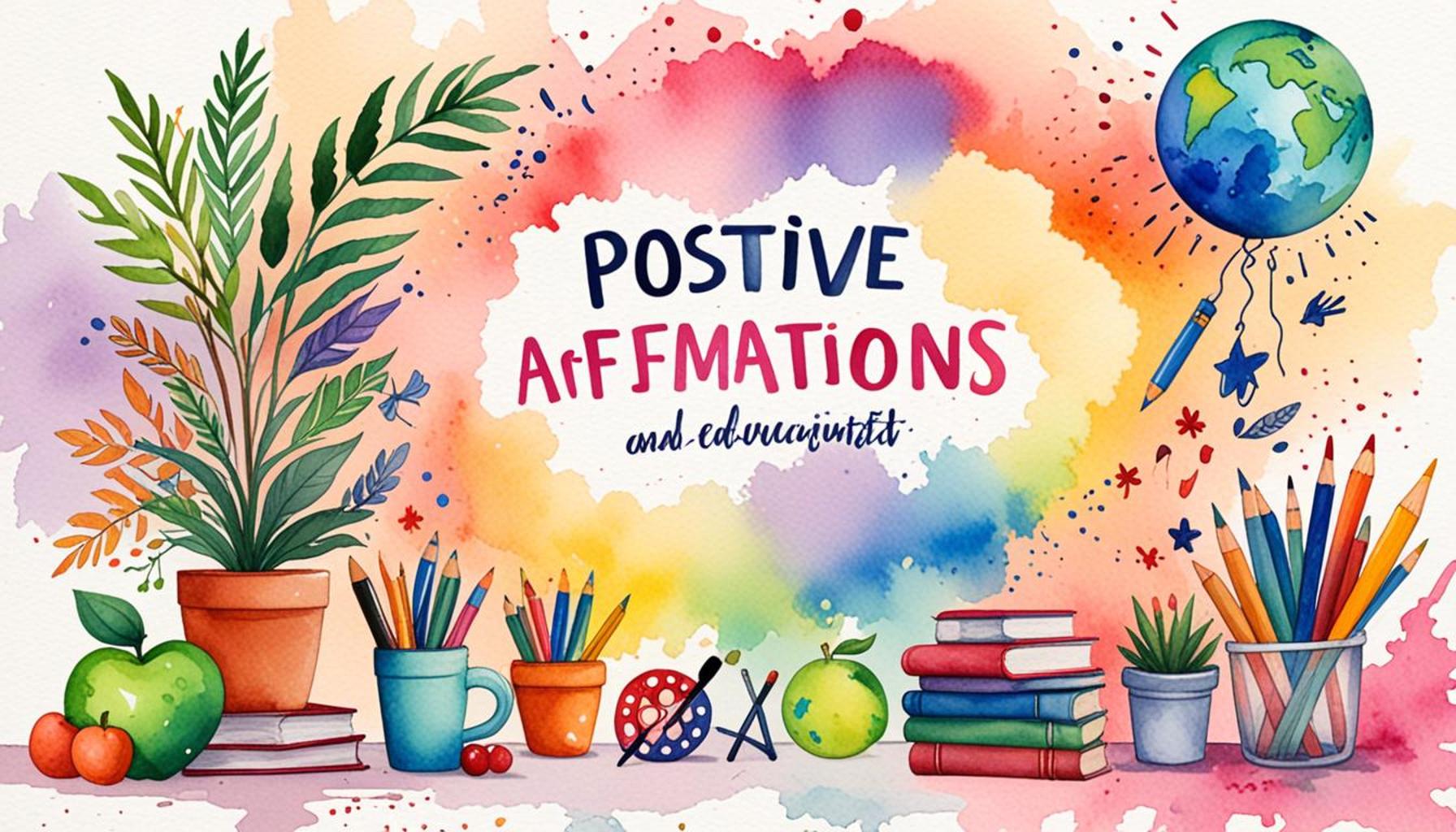Positive Affirmations and Education: How to Strengthen a Growth Mindset in Academic Settings

The Role of Positive Affirmations in Education
In today’s rapidly evolving educational landscape, the concept of a growth mindset has emerged as a vital component of student success. Positive affirmations serve as powerful tools that can significantly contribute to nurturing this mindset, encouraging students to view challenges as opportunities to learn and grow rather than obstacles to overcome.
The underlying principle of positive affirmations is simple yet impactful; they empower students by reshaping their internal dialogue. Research indicates that when students engage in positive self-talk, they often experience improved academic outcomes. This is particularly evident in environments where motivation and perseverance are critical for progression.
To illustrate, consider a student who struggles with mathematics. Instead of succumbing to frustration, this learner may recite affirmations such as, “I am capable of solving complex problems” or “Every mistake teaches me something valuable.” By adopting such statements, students can unlock their potential, opening doors to new ways of thinking and problem-solving.
Key Benefits of Positive Affirmations
- Increased Confidence: Regular practice of affirmations can help students develop a sense of self-efficacy, making them feel more capable of achieving their academic goals. This newfound confidence can spur them into actively seeking help when needed, participating in discussions, or undertaking challenging projects.
- Enhanced Resilience: In the face of academic setbacks, a focus on positivity fosters resilience. For instance, when students face a poor exam result, rather than feeling defeated, they can reframe the experience as a stepping stone for growth, prompting them to revisit and strengthen their understanding of the subject matter.
- Improved Focus: Positive affirmations also contribute to heightened concentration and motivation. When students begin their day with uplifting statements, they set a positive mental tone that can carry through their daily tasks, reducing distractions and increasing productivity.
In Nigeria, where educational challenges, such as limited resources and overcrowded classrooms, can hinder student performance, the positive impact of affirmations is particularly significant. Educators are increasingly realizing that integrating affirmations into the curriculum creates a nurturing and supportive classroom atmosphere. This shift not only aids individual student development but also enhances collaboration and peer support within the educational environment.
As discussions around the growth mindset gain momentum in academic circles, exploring the practical application of positive affirmations becomes crucial. Embracing this approach can lead to profound transformations, allowing students to navigate their educational journeys with greater resilience and positivity.

This article aims to provide insights into effective strategies for implementing affirmations in classrooms, along with compelling evidence that supports their effectiveness in cultivating a robust and resilient mindset among students. As the educational landscape continues to evolve, the role of positive affirmations will undoubtedly remain pivotal in shaping the future of learning in Nigeria and beyond.
YOU MAY ALSO LIKE: Read read another article
Harnessing Affirmations to Foster a Growth Mindset
Positive affirmations have proven to be transformative in enhancing students’ self-perception and academic performance. As students learn to articulate positive beliefs about their abilities, they create a mental framework that not only propels them forward but also redefines their expectations of success. In a nation like Nigeria, where educational disparities are often pronounced, incorporating these practical tools may bridge gaps and inspire students to reach their full potential.
Research suggests that students who engage regularly with affirmations experience shifts in mindset that align closely with the concept of a growth mindset. They begin to understand that intelligence and abilities are not fixed traits, but rather qualities that can be developed through dedication and hard work. This perspective shift is especially vital in an environment where academic challenges are prevalent and perseverance is required to achieve educational goals.
Implementing Affirmations in Academic Settings
To effectively integrate positive affirmations in classrooms, educators can adopt several strategies tailored to local contexts. Here are some noteworthy practices:
- Daily Affirmation Rituals: Start each school day with a collective affirmation exercise. Students can recite phrases such as, “I am learning and growing every day,” fostering a sense of community while reinforcing a shared commitment to personal development.
- African Proverbs in Affirmations: Incorporating culturally relevant sayings can further enhance the impact. For instance, proverbs like “Wisdom is like a baobab tree; no one individual can embrace it” can be adapted into affirmations that emphasize teamwork and collective wisdom in overcoming challenges.
- Affirmation Journals: Encourage students to maintain journals where they write daily or weekly affirmations. This practice not only promotes self-reflection but also provides a tangible reminder of their positive attributes and efforts.
The importance of supporting this growth mindset through positive affirmation is underscored by studies indicating enhanced academic performance and reduced anxiety levels among students. In settings characterized by economic challenges, such as those often found in Nigerian schools, these affirmations have the potential to provide students with a psychological safety net, motivating them to tackle not only academic tasks but also personal challenges.
In addition, educators play a critical role in modeling and reinforcing these affirmations. By demonstrating their own commitment to a growth mindset, teachers can foster an environment in which students feel empowered to express their challenges and celebrate their successes. When students witness their teachers embracing affirmations and adopting positive self-talk, they are more likely to do the same.
As the wave of change in educational practices continues to sweep across Nigeria, harnessing the power of positive affirmations offers a promising path forward. This approach not only cultivates resilience and motivation among students but also nurtures a generation ready to embrace learning as a lifelong journey, driven by the willingness to explore and enhance their capabilities.
| Key Advantages | Impact on Learning |
|---|---|
| Enhanced Resilience | Students develop the ability to overcome academic challenges through positive self-dialogue, fostering a culture of perseverance. |
| Increased Motivation | Affirmations encourage a proactive approach towards learning, igniting curiosity and a desire for improvement among students. |
Positive affirmations serve as powerful tools in nurturing a growth mindset within academic settings. By incorporating daily affirmations into classroom routines, educators can instill a sense of optimism and self-efficacy among students. This practice can lead to significant shifts in their academic performance and personal growth.As students confront obstacles, the affirmation of their capabilities can enhance their resilience, making them less likely to view failures as roadblocks. Instead, they can interpret setbacks as vital feedback on their learning journeys, thereby sharpening their problem-solving skills. Evidence suggests that students who embrace a growth mindset are more likely to seek out challenges, persist through difficulties, and achieve better overall outcomes.Moreover, the infusion of positive affirmations into educational practices fosters an environment of collaboration. In settings where students support one another through encouragement and affirmation, peer relationships strengthen, leading to heightened levels of engagement and enthusiasm towards learning. As educators explore various methods of integrating affirmations into their curriculum, the wide-ranging benefits on social dynamics and academic performance become more evident. This dynamic interplay between individual mindset and collective classroom culture underscores the profound implications of affirmative practices in education.
YOU MAY ALSO LIKE: Read read another article
Creating a Supportive Environment through Positive Affirmations
To further strengthen a growth mindset within academic settings, the atmosphere in which students learn plays an indispensable role. A supportive environment is one where positive affirmations are not only used by the students but also embraced by teachers, parents, and the wider community. Creating this ecosystem involves collaboration, communication, and reinforcement of affirmative practices across various layers.
One effective approach is empowering parents to engage in affirmation practices with their children at home. By encouraging families to incorporate daily affirmations into their routines, educators can extend the reach of these positive messages beyond the school walls. For instance, a family might create a morning ritual where each member shares what they appreciate about each other or articulates their goals for the day using affirmations. Such practices reinforce the idea that growth is a shared journey, emphasizing both individual and collective progress.
The Role of Technology in Promoting Affirmations
In today’s digitally driven world, technology can serve as a significant ally in spreading positive affirmations. Mobile apps and social media platforms can be utilized to generate a sense of community around the practice of affirmations. Schools can create dedicated online groups where students share their affirmations, celebrate milestones, and uplift each other in times of struggle. This virtual connection can be particularly beneficial for students in remote or underserved areas, allowing them to feel part of a larger supportive community.
Additionally, educators can introduce multimedia resources that focus on positive affirmations, such as podcasts, videos, and blogs. These resources can feature successful individuals from Nigeria who credit their achievements to adopting a growth mindset supported by affirmations. Through narratives that resonate culturally, such as the stories of well-known figures overcoming challenges, students can internalize the belief that their potential is indeed limitless.
Empirical Evidence Supporting Affirmation Practices
Empirical studies underscore the effectiveness of positive affirmations in educational contexts. For instance, a study published in the Journal of Educational Psychology found that students who practiced positive self-affirmations exhibited an increase in their overall academic performance, particularly in high-stake testing environments. Moreover, participants reported lower levels of test anxiety, indicating that affirmations can reduce psychological barriers that hinder academic success.
Moreover, a recent survey conducted among Nigerian educators revealed that 78% believe integrating daily affirmations into lessons leads to improved classroom behavior and student engagement. Such findings highlight the tangible benefits of these practices not only for individual learners but also for the educational system at large.
In combating social and economic challenges prevalent in Nigeria’s education system, the introduction of positive affirmations is not merely a pedagogical innovation; it is a vital component in fostering resilience and hope. The integration of culturally relevant affirmations coupled with data-driven approaches supports not just academic achievement but holistic development. With the right tools and support, educators can guide students toward realizing their capabilities, setting them on a promising trajectory in their education and beyond.
RECOMMENDED: Check out this similar article
Conclusion
In closing, the integration of positive affirmations within educational environments holds immense potential to cultivate a robust growth mindset among students. By fostering a culture of positivity, educators, parents, and communities can create a fertile ground for students to thrive academically and emotionally. The significance of a supportive ecosystem cannot be overstated; it is a collective effort that encourages learners to embrace challenges and view setbacks as opportunities for growth.
The combination of classroom practices and home engagement, as well as the utilization of technology, allows for the widespread dissemination of affirmation practices. This adaptability not only enhances learning outcomes but also promotes a sense of belonging among students. As demonstrated by empirical research, including findings from the Journal of Educational Psychology, the effects of these affirmations translate into tangible improvements in academic performance and overall student well-being.
Furthermore, as Nigeria navigates the complexities of its educational landscape, now is the time to harness the power of positive affirmations to build resilience and hope among students. The stories of local success narratives can serve as compelling reminders that every student has the potential to achieve greatness. By committing to this transformative approach, we can empower the next generation and equip them with the tools necessary to realize their dreams and contribute meaningfully to society.
As we look to the future, let us advocate for the incorporation of positive affirmations in every academic setting, recognizing that when we believe in our potential, we can achieve extraordinary results.



